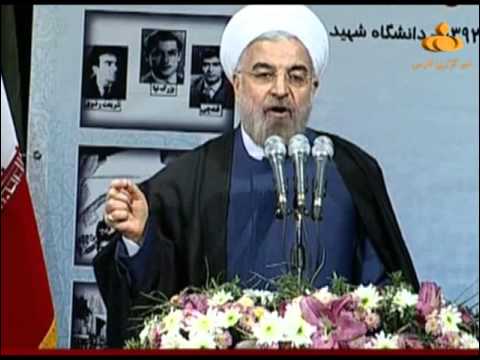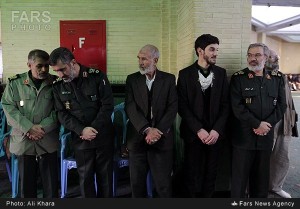LATEST: Military Memorial for Slain Hezbollah Commander Laqees
THURSDAY FEATURE
Has Supreme Leader Suddenly Renounced Nuclear Talks?
The Rouhani Government is on the defensive over its promise to open up Iranian culture and society, with Parliament issuing a warning to Culture and Islamic Guidance Minister Ali Jannati.
MPs summoned Jannati for questioning and criticism over his approach to media and the Internet, blaming him for an approach that allowed “liberal” — rather than “revolutionary” — outlets to operate. Jannati was also challenged over his comments over the closure of a leading reformist newspaper, Bahar, and belief that women should be allowed to sing solo in public.
Female singers have been banned from performing alone since the 1979 Revolution and the establishment of the Islamic republic. Jannati said that if the singing did not lead to corruption, it was admissible. He repeated in Parliament that solos as lullabies should be allowed.
The Culture Minister reassured MPs, “We will definitely not allow insult against the sanctities of the establishment and religion in the press area”; however, at the end of the session, he was shown a “yellow card”, a warning that if he continued to transgress, he could be summoned for interrogation leading to a “red card” and dismissal.
President Rouhani reacted on Wednesday, saying the yellow card was “not a worry”.
The President said, “Some officials have obviously not heard the people’s voice in the election. I promise the people to stop extremism in Iran.”
In the last month, a number of cultural activists, including cyber-activists and musicians, have been detained. MPs, the military, and clerics have all used warnings about the “sedition” after the dispute 2009 Presidential election to warn Rouhani not to move on his campaign promise to free political prisoners, including detained opposition leaders Mir Hossein Mousavi and Mehdi Karroubi.
Rouhani insisted on Tuesday that he would continue to pursue the policy of openness. Meeting artists, musicians, actors, and writers, he said, “Artists are not a threat, and art without freedom is meaningless.”
He added, “We should reach out to those artists who have been isolated in the past few years, getting them more involved in society and preventing censorship.
Military Memorial for Slain Hezbollah Commander Laqees
Minister of Defense Hossein Dehghan and Islamic Revolutionary Guards Corps commanders have spoken at a service for Lebanese Hezbollah commander Hassan Laqees, assassinated near Beirut in December.
At a joint memorial for the Hezbollah officer and a Revolutionary Guards commander, Dehghan said, “Hassan Laqees was among the individuals trained by IRGC forces.”
Qods Force Commander Qassem Suleimani, Revolutionary Guards Naval Commander Ali Fadavi, and Revolutionary Guards Aerospace Commander Amir Ali Hajizadeh were among those in attendance.
IRGC commanders with Laqees’ son:
MP Motahari Remains Defiant Over Call for Review of Political Prisoners
MP Ali Motahari, despite the threat of prosecution, has maintained his call for a review of the sentences of political prisoners detained after the disputed 2009 Presidential election.
In an interview with the Iranian Students News Agency, Motahari cited “the people’s demands for impartial investigation into all aspects of the 2009 post-election events” and said “the lifting of house arrests and the freedom of political prisoners are the legitimate demand of supporters of the Government”.
Last week, authorities filed charges against Motahari for “insulting the judiciary” with his comments. The MP maintained that he had immunity for remarks in Parliament, and was supported on Wednesday by Speaker of Parliament Ali Larijani.
In his latest interview, Motahari criticised for “staying quiet” during the “dictatorship” of the Ahmadinejad Government, and said “minor extremists” in the Majlis were unhappy because of President Rouhani’s victory last year.
Meanwhile, high-level judiciary official Mohammad Javad Larijani has made a cryptic comment which may or may not point to a review of the 35-month house arrests of opposition leaders and 2009 Presidential candidates Mir Hossein Mousavi and Mehdi Karroubi.
Larijani, the brother of the Speaker of Parliament and the head of the judiciary, said the case of Mousavi and Karroubi was “under investigation…because of their long positive history in the system”.
And Ayatollah Dastgheib has written an open letter to Mousavi and his wife Zahra Rahnavard — who has also endured the house arrest — saying how he appreciated how they and Karroubi “have fulfilled their duty towards people and Islam”.
Rafsanjani Points to End of Rouhani “Engagement” with Saudi Arabia
Judging from comments of former President Hashemi Rafsanjani, the Rouhani Government’s effort at “engagement” with Saudi Arabia is now suspended.
Rafsanjani said in an interview that the Iran-Saudi relationship has worsened in recent years. Asked if he could help heal the wounds, he said that he could not since he does not have any official responsibility and authority: “The restoration of this relationship is firstly in hands of the Supreme Leader and secondly the Government.”
That is a marked shift in position from last autumn, when Rafsanjani used his website to hail the possibility of a rapprochement with Riyadh. The site featured a photographs from the 1990s, when President Rafsanjani met high-level Saudi officials. Rafsanjani also went to the Kingdom in 2010 at the head of an Iranian delegation.
This week, hard-line attacks on Saudi Arabia have been accompanied by denunciation of Riyadh in “moderate” Iranian outlets, especially over Saudi support of Syrian insurgents.
See Iran Daily, Jan 7: Attacks on Saudi Arabia Challenge Rouhani’s “Engagement”
Defiant Rafsanjani Daughter at Her Trial: “Officials Should Open Ears to Hear People’s Outcry”
Fatemeh Hashemi, the daughter of former President Hashemi Rafsanjani, has expressed defiance at her trial, declaring, “I wanted to have a public trial, but they [authorities] knew my defence would be to their disadvantage.”
Hashemi, arrested during protests after the disputed 2009 Presidential election, is accused of insulting the head of Judiciary and the spokesman of Parliament.
She said,”Officials should open their ears so they can hear the people’s outcry.”
Speaker of Parliament Ali Larijani expressed his desire for an end to the proceedings:
I have never sued Mrs Hashemi….I believe that this case should close as soon as possible.
Oil Minister: Imprisoned Billionaire Zanjani “Owes $3.5 Billion”
Oil Minister Babak Namdar Zanganeh has piled the pressure on imprisoned billionaire Babak Zanjani, saying the tycoon owes 2.6 billion Euros ($3.5 billion) to the Ministry.
Zanganeh said the Ministry has not received the money, and documents that Zanjani submitted to the Central Bank to show that he paid the debt have not been verified.
Zanjani said that Zanjani claimed the money was sent through the National Bank of Tajikistan.
A Parliamentary report last month said the debt is linked to tens of thousands of barrels of crude oil that the Ahmadinejad Government, facing international sanctions, had sold through Zanjani.
Zanjani is now in Evin Prison on charges of embezzlement and fraud.
Head of judiciary Sadegh Larijani said on Wednesday, “The defendant was under supervision for several months and given an appropriate respite to return the people’s money. However, the actions he failed to take were the cause of the conflict and his judicial review.”
Senior MP: International Conference on Syria is “Doomed”
Mansour Haghighatpour, a member of Parliament’s National Security Commission, has said that a proposed international “peace” conference on Syria is “doomed”.
Iran’s official line is that it wants to attend the January 22 gathering in Switzerland. Tehran’s presence has been blocked by the US, although Secretary of State John Kerry said last weekend that Iran could “contribute from the sidelines”.
The Foreign Ministry said Kerry’s remarks insulted Iran’s honour. Haghighatpour went farther:
The Islamic Republic of Iran has a prestige of its own and being in the fringes is not compatible with this prestige.
We are capable of changing the developments in the region, and need not attend the Geneva II conference.
The head of the Basij militia, Mohammad Reza Naqdi, warned on Wednesday, “They[the international community] will lose the opportunity of having Iranians and any decision to be made at the Geneva II conference will be flawed.”
Supreme Leader Warning Over US and Nuclear Talks
As high-level discussions over an interim nuclear deal resume, the Supreme Leader has issued a warning that the talks have “revealed the US’s animosity toward the Islamic Republic“.
Ayatollah Khamenei also said that the US Government is the biggest violator of human rights in the world.
See Has Supreme Leader Suddenly Renounced Nuclear Talks?
High-Level Nuclear Talks Resume, Seeking Implementation of Deal — Iran-US Discussions As Well?
Seeking implementation of November’s interim nuclear deal, high-level negotiators for Iran and the 5+1 Powers begin two days of talks in Geneva on Thursday.
Iranian Deputy Foreign Minister Abbas Araqchi will meet Helga Schmid, the deputy negotiator for the 5+1 (US, Britain, Germany, France, China, and Russia).
Araqchi said that the lead US negotiator, Wendy Sherman, may also be involved.
Writing on his Facebook page on Wednesday, Foreign Minister Mohammad Javad Zarif was optimistic, “Nuclear talks are going on strongly and seriously, expert negotiators have accomplished good results out of long hours of talks.”
Earlier this month, Iranian officials said that implementation of the interim deal over enrichment of uranium and lifting of sanctions would begin January 20. However, Araqchi then said that “certain political issues” had to be resolved.
Unnamed diplomats have told journalists that one key issue is whether Iran will be allowed to introduce new centrifuges for enrichment during the six-month period, or can only pursue “research and development”.
Under the agreement, Iran has promised to limit enrichment of uranium to 5%, suspending the process at the 20% level.


